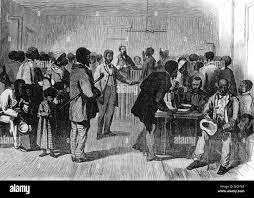The establishment of the Freedmen’s Bureau in the aftermath of the Civil War marked a significant intervention by the federal government to address the immediate needs of the newly freed African American population.
Tasked with a wide range of responsibilities, the Freedmen’s Bureau focused on providing essential services such as food, education, and legal assistance to those who had been emancipated. This assistance was invaluable in a time when the social and economic systems of the South were in disarray.
 [The photo above depicts the interior of the Freedmen’s Bureau building in Richmond in 1866.]
[The photo above depicts the interior of the Freedmen’s Bureau building in Richmond in 1866.]
Education initiatives spearheaded by the Bureau opened the doors to literacy and learning for both adults and children, laying the foundation for future opportunities and empowerment.
By offering legal assistance, the Freedmen’s Bureau worked to protect the rights of freedmen, helping people navigate the complexities of their new legal status.
The impact of the Freedmen’s Bureau in Virginia extended beyond these tangible forms of assistance. It symbolized a commitment by the United States to the reconstruction of not just the physical infrastructure of the South, but also its social fabric.
The Bureau’s efforts to educate and legally empower African Americans were seen as essential steps towards their integration as full citizens, capable of contributing to and benefiting from American society.
Despite facing significant challenges, the work of the Freedmen’s Bureau in Virginia represented a beacon of hope for many. It was a testament to the possibility of change and the federal government’s role in facilitating that change during one of the nation’s most challenging periods.
Through its various programs and initiatives, the Freedmen’s Bureau laid the groundwork for the gradual transformation of Virginia’s social, economic, and political landscape in the post-Civil War era, embodying the ideals of freedom and equality that Reconstruction sought to achieve.


